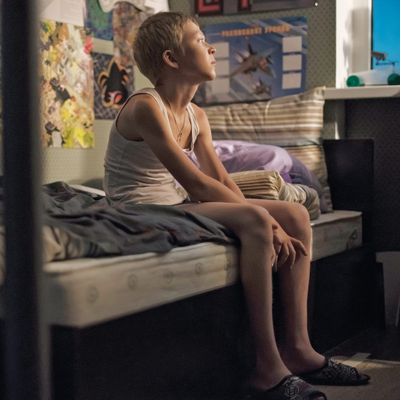
Loveless is the title of Russian director Andrey ZvyagintsevÔÇÖs drama of a 12-year-old boyÔÇÖs disappearance, and the word might as well be etched into the screen, hovering in chalk-colored skies over denuded trees on the outskirts of Moscow ÔÇö home of a soon-to-be-divorced woman and man who really, really, really, really hate each other (ÔÇ£IÔÇÖve fucking had it with youÔÇØ; ÔÇ£ScumbagÔÇØ) and have no use for their son, either. Loveless is about a state of mind, a lament, an indictment of crimes against the human spirit.
This is clear before humans even make their first appearance. Zvyagintsev opens with a winterscape of dead trees. Shots two through nine offer variations thereof. Two ducks drift by in shots ten and 11. The next shot is a large building with an empty lot, over which a Russian flag flutters grimly. The faceless structure is a school that belches out children ahead of young Alyosha (Matvey Novikov), who trudges home alone to find his mother, Zhenya (Maryana Spivak), showing the family apartment to prospective buyers, a man and his pregnant wife. Mute with anger and grief, Alyosha refuses to make eye contact. Soon, we learn that the boyÔÇÖs father, Boris (Aleksey Rozin), doesnÔÇÖt want custody of him, and neither does Zhenya, who says, ÔÇ£IÔÇÖm moving on, too.ÔÇØ To a woman doing her hair, she complains that her son is beginning to smell like her husband. She didnÔÇÖt want the child, she tells her lover, Anton (Andris Keiss), a successful older man, adding, ÔÇ£I wasnÔÇÖt even producing milk.ÔÇØ
One word springs to mind after 15 minutes of Loveless: Getmethefuckoutofhere. The chill eats into you ÔÇö the cold burns and cuts. But it turns out Zvyagintsev has more on his mind than emotional cruelty to kids. By the time the boy vanishes, the director has immersed us in a world in which the milk of human kindness has dried up at the teat.
Vladimir Putin has something to do with this present state of lovelessness, which wonÔÇÖt surprise you if youÔÇÖve seen ZvyagintsevÔÇÖs Elena (2011) and Leviathan (2014) ÔÇö the latter of which portrays a society so thoroughly poisoned by greed and political favoritism that the directorÔÇÖs rage reaches biblical proportions. A cold rage, of course. Always cold. The Austrian iceman Michael HanekeÔÇÖs influence is apparent in shots held for extra beats, charactersÔÇÖ myopia, and the insistent political undertow. But Zvyagintsev doesnÔÇÖt have HanekeÔÇÖs punk snottiness. He hurts you so youÔÇÖll feel. In the second hour of Loveless, he generates an aura of humanism out of thin air.
He does so in stages. First comes the faint revulsion of the world-weary search-party coordinator (Alexey Fateev) and his female partner (Varvara Shmykova) in the face of Zhenyas and Boriss attitudes toward their son  nothing big, just mild exclamations over unsympathetic turns of phrase. Then Zvyagintsev introduces Zhenyas mother (Natalya Potapova), who lives in a lightless warren outside Moscow and makes her daughter look like Glinda the Good Witch (Look what youve become  a whore  Get the fuck out). Its a wonder Zhenya has an ounce of compassion for anything. When she tears into Boris on the way back to Moscow (Thank God I met a good man), Boris throws her out of his car in the middle of nowhere. He goes back to his young lover, Masha (Marina Vasilyeva), whos carrying a child to which he might pay more attention, but I wouldnt put money on it.
As searchers move through the woods, the beams from their flashlights diffused by the snow from an Arctic storm, the female detective wails AlyoshaÔÇÖs name, and the sound that comes out of her mouth is otherworldly. It gets into your blood. ZhenyaÔÇÖs face begins to soften, as if registering the full horror of what she has done ÔÇö and not done. Every shot becomes an objective correlative: the rusted abandoned factories with pools of water, the dank morgue to which the couple is summoned. An elevator descends in a building where the boy might be and searchers watch in silence as the doors open to two giggling teenage girls out for a night on the town ÔÇö another world heard from. Normally, a scenario that centers on a vanished child would make you sick with suspense and dread. But at a certain point in Loveless you begin to feel something else, less specific but larger, as if listening to a quietly anguished piece of music like MahlerÔÇÖs Kindertotenlieder. You start to grieve for every child.
The movie has its puzzlers. In several shots, Zvyagintsev lingers on SpivakÔÇÖs bare butt and the backs of her thighs: Is he critiquing her for being sexual (as opposed, I guess, to maternal) or critiquing a world that would gaze on her the way that, well, he is? ThereÔÇÖs a baffling point-of-view shot in a fancy restaurant, in which an unseen man asks a beautiful woman (who stares into the camera) for her phone number, which she gives him before sitting back down with her date.
Who are those people? Is the director reminding us that love is inconstant? Big news.
Back to children. TheyÔÇÖre happily sledding as an announcer on a TV in ZhenyaÔÇÖs new apartment describes Ukraine ravaged by the Putin-backed army. The screen shows Ukrainian women weeping. Stone-faced Zhenya runs on a treadmill wearing a jacket that reads RUSSIA. Oh, boy, was the whole movie meant to be that symbolic? Better not to pin it down. Zvyagintsev, at the very least, powerfully anatomizes a disease for which a possible cure will be movies like Loveless.
*This article appears in the February 5, 2018, issue of New York Magazine. 


